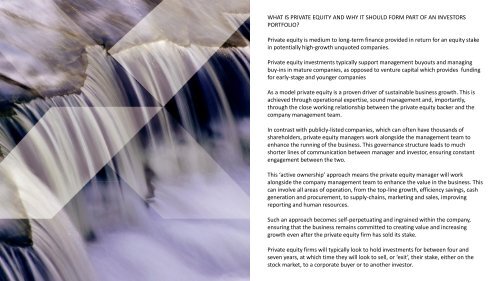Exponential Genesis Brochure
The Genesis Private Equity Fund
The Genesis Private Equity Fund
You also want an ePaper? Increase the reach of your titles
YUMPU automatically turns print PDFs into web optimized ePapers that Google loves.
WHAT IS PRIVATE EQUITY AND WHY IT SHOULD FORM PART OF AN INVESTORS<br />
PORTFOLIO?<br />
Private equity is medium to long-term finance provided in return for an equity stake<br />
in potentially high-growth unquoted companies.<br />
Private equity investments typically support management buyouts and managing<br />
buy-ins in mature companies, as opposed to venture capital which provides funding<br />
for early-stage and younger companies<br />
As a model private equity is a proven driver of sustainable business growth. This is<br />
achieved through operational expertise, sound management and, importantly,<br />
through the close working relationship between the private equity backer and the<br />
company management team.<br />
In contrast with publicly-listed companies, which can often have thousands of<br />
shareholders, private equity managers work alongside the management team to<br />
enhance the running of the business. This governance structure leads to much<br />
shorter lines of communication between manager and investor, ensuring constant<br />
engagement between the two.<br />
This ‘active ownership’ approach means the private equity manager will work<br />
alongside the company management team to enhance the value in the business. This<br />
can involve all areas of operation, from the top-line growth, efficiency savings, cash<br />
generation and procurement, to supply-chains, marketing and sales, improving<br />
reporting and human resources.<br />
Such an approach becomes self-perpetuating and ingrained within the company,<br />
ensuring that the business remains committed to creating value and increasing<br />
growth even after the private equity firm has sold its stake.<br />
Private equity firms will typically look to hold investments for between four and<br />
seven years, at which time they will look to sell, or ‘exit’, their stake, either on the<br />
stock market, to a corporate buyer or to another investor.







